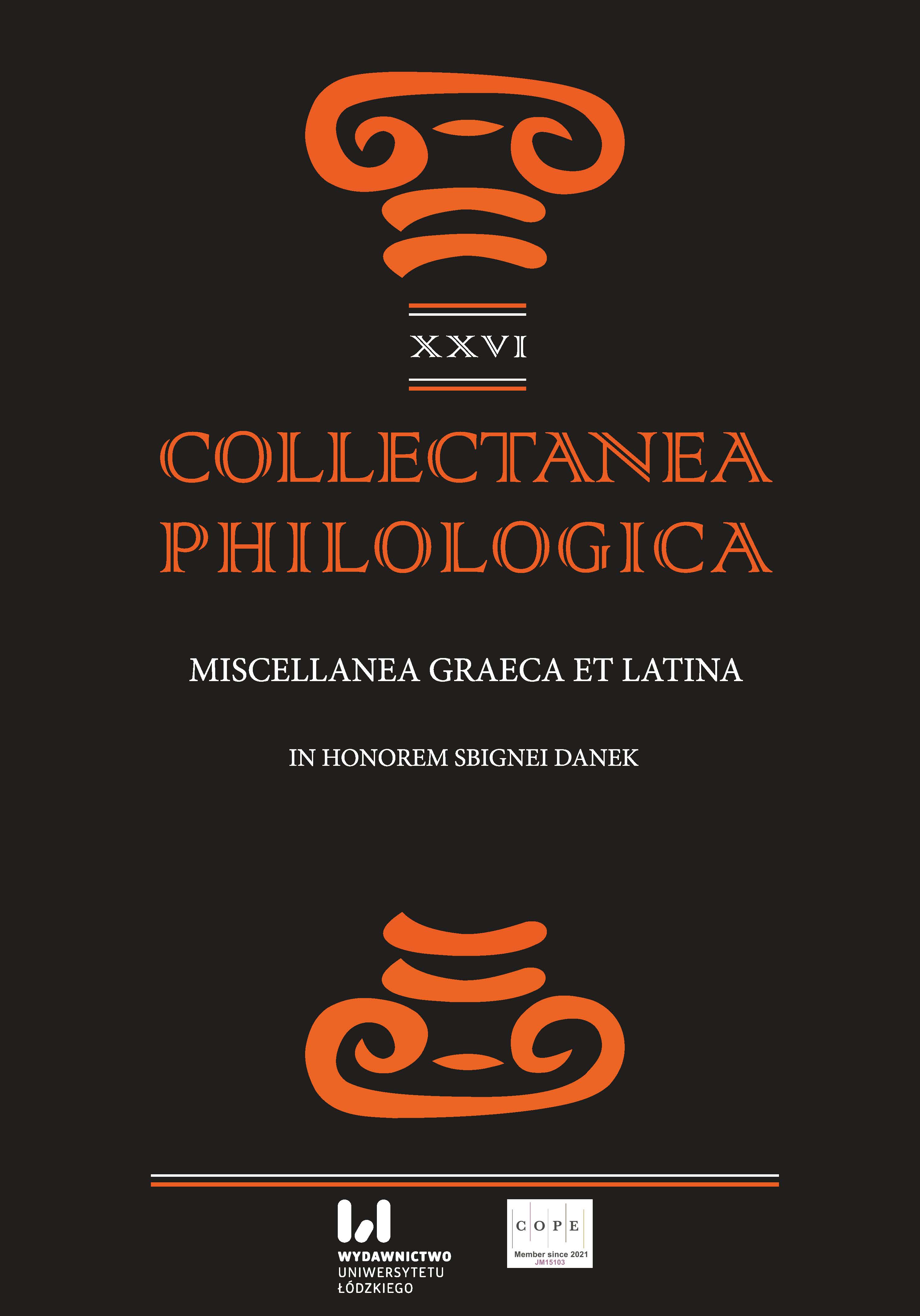Problem winy i odpowiedzialności za zbrodnię w Orestesie Eurypidesa
DOI:
https://doi.org/10.18778/1733-0319.26.04Słowa kluczowe:
Eurypides, Orestes, Apollo, tragedia, scholiaAbstrakt
The myth of Orestes provides an excellent opportunity to trace the issue of guilt, and thus responsibility for the crime of matricide. This theme was taken up in their dramas by all three greatest Greek tragedians: Aeschylus, Sophocles and Euripides. The subject of consideration in the article will be Euripides’ Orestes and the way the poet highlights the relationship between the personal motivation of the play’s protagonist and the divine command. The main issue will be an attempt to answer the question whether the protagonist’s actions in Euripides’ play were autonomous in nature or caused by divine determinism. Apart from Orestes, the analysis will be supplemented by commentaries by scholastics and their way of explaining and interpreting the issues outlined in the article.
Bibliografia
Ajschylos. (2016). Tragedie. T. 2. Przeł. i oprac. R.R. Chodkowski. Lublin: Towarzystwo Naukowe KUL.
Google Scholar
Arystoteles. (1993). O rodzeniu się zwierząt (De generatione animalium). Przeł. i oprac. P. Siwek. W: Arystoteles, Dzieła wszystkie. T. 4: 77–247. Warszawa: PWN.
Google Scholar
Arystoteles. (1988) Retoryka. Poetyka. Przeł. i oprac. H. Podbielski. Warszawa: PWN.
Google Scholar
Euripides. (1960). Fabulae. G. Murray (ed.). T 3. Oxford: Oxonii.
Google Scholar
Eurypides. (2017). Tragedie. T 1. Przeł. i oprac. R.R. Chodkowski. Lublin: Towarzystwo Naukowe KUL.
Google Scholar
Eurypides. (2018). Tragedie. T 2. Przeł. R.R. Chodkowski. Lublin: Towarzystwo Naukowe KUL.
Google Scholar
Homer. (2022). Iliada. Przeł. i oprac. R.R. Chodkowski. Lublin: Towarzystwo Naukowe KUL.
Google Scholar
Mastronarde, Donald J. (2020). Eurypides. Scholia: Scholia on „Orestes” 1–500, Oakland, [w:] https://escholarship.org/uc/item/7xp733bb [7.05.2021].
Google Scholar
Scholia in Euripidem. (1966). E. Schwartz (ed.). Vol. I–II. Berlin: De Gruyter.
Google Scholar
Battezzato, L. (2000). Ospitalità rytuale, amicizia e charis nell’Ecuba. In: Ricerche euripidee. T. 1. A cura di O. Vox. Lecce: Pensa MultiMedia. 13–41.
Google Scholar
Carpanelli, F. (2005). L’evoluzione del dramma e i nuovi orizzonti istituzionali ad Atene. Torino: UTET Libreria.
Google Scholar
Cataudella, Q. (1976). Lektura dello ‘Ione’ Euripideo. In: Euripide. Letture critiche, a cura O. di Longo. Milano: Mursia Editore. 110–127.
Google Scholar
Chodkowski, R.R. (1985). „Udział bóstwa w podejmowaniu decyzji bohatera tragicznego u Ajschylosa”, Roczniki Humanistyczne, XXXIII, z. 3. 19–42.
Google Scholar
Czerwińska, J. (2006). „Hercules furens – Eurypidejska przypowieść o ludzkim szaleństwie”. Collectanea Philologica IX. 87–111.
Google Scholar
Czerwińska, J. (2013). Innowacje mitologiczne i dramaturgiczne Eurypidesa. Łódź: Wydawnictwo Uniwersytetu Łódzkiego.
Google Scholar
Di Benedetto, V. (1971). Euripide: teatro e società. Torino: Einaudi.
Google Scholar
Di Benedetto, V., Medda, E. (1997). La tragedia sulla scena. Torino: Einaudi.
Google Scholar
Dodds, E.R. (2002). Grecy i irracjonalność. Bydgoszcz: Wydawnictwo Homini.
Google Scholar
Kaimio, M. (1988). Physical Contact in Greek Tragedy. A Study of Stage Conventions. Helsinki: Suomalainen Tiedeakatemia.
Google Scholar
Kitto, H.D.F. (1997). Tragedia grecka. Studium literackie. Bydgoszcz: Wydawnictwo Homini.
Google Scholar
Lesky, A. (2006). Tragedia grecka. Przeł. M. Weiner. Kraków: Homini.
Google Scholar
Łanowski, J. (1967). Słowo wstępne. W: Eurypides. Tragedie. T. 1. Przeł. J. Łanowski. Warszawa: PIW.
Google Scholar
Marzolo, C. (1996). L ultimo Euripide: tra gesto e parole. Padova: Antenore.
Google Scholar
Medda, E. (2001). Introduzione. In: Euripide. Orestes, introduzione, traduzione e note di E. Medda. Milano: BUR Classici Greci e Latani. 5–73.
Google Scholar
Murray, G. (1932). Euripide e i suoi tempi. Trad. it. N. Ruffini. Bari: Editori Laterza.
Google Scholar
Murray, G. (1948). Greek Studies. Oxford: University Press.
Google Scholar
Paduano, G. (2005). Il teatro antico. Bari: Editori Laterza.
Google Scholar
Pohlenz, M. (1978). La tragedia greca. Vol. 1. Trad. it. M. Bellincioni. Brescia: Paideia Editrice.
Google Scholar
Reale, G. (1993). Historia filozofii. T. 1. Przeł. I. Zieliński. Lublin: Redakcja Wydawnictw KUL.
Google Scholar
Sowa, J. (2014). „Czy kobieta jest potworem? Płeć żeńska w De generatione animalium Arystotelesa”. Roczniki Humanistyczne. LXII, z. 3. 29–50.
Google Scholar
Sowa, J. (2016). „O tajemniczych «ruchach» w De generatione animalium IV 3. Płeć żeńska w Arystotelesowskiej teorii dziedziczenia”. Roczniki Humanistyczne. LXIV, z. 3. 31–52. https://doi.org/10.18290/rh.2016.64.3-3
Google Scholar
Opublikowane
Wersje
- 2023-12-08 - (2)
- 2023-10-05 - (1)
Jak cytować
Numer
Dział
Licencja

Utwór dostępny jest na licencji Creative Commons Uznanie autorstwa – Użycie niekomercyjne – Bez utworów zależnych 4.0 Międzynarodowe.












